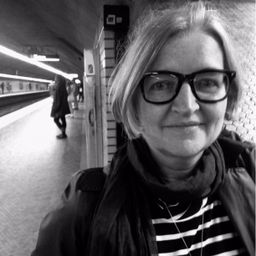
Sessions in which Prof. Susan Ross participates
Tuesday 7 June, 2016
Sessions in which Prof. Susan Ross attends
Friday 3 June, 2016
This forum will explore the current directions of critical heritage studies and what makes ACHS distinctive. Panel members will discuss what the term critical means to them, and what directions they would like to see develop in the future. To help develop an open dialogue, the session will also give considerable time to contributions from the audience.
Welcome addresses and cocktail, followed by the Concordia Signature Event "The Garden of the Grey Nuns". As the opening ceremony and cocktail take place in the former Grey Nuns' Motherhouse, recycled into campus residence and reading rooms by Concordia University, delegates will also have the possibility to discover the video Three Grey Nuns (3 minutes, by Ron Rudin and Phil Lichti. Three Grey Nuns recount their memories of communal life in the Grey Nun’s Motherhouse. Built...
Working with archival documents and the current-day morphology of the Grey Nuns' site, Dr Cynthia Hammond, Dr Shauna Janssen, in collaboration with Dr Jill Didur, will curate a series of installations and performances that speak directly to the rich heritage of a specific urban landscape: the gardens of the Grey Nuns' Motherhouse, now part of the Concordia University downtown campus. Visitors will have the opportunity to explore the lost working gardens of the Grey Nuns. As with other such...
Saturday 4 June, 2016
What if we changed our views on heritage? And if heritage has already changed? While, on the global scene, states maintain their leading role in the mobilization of social and territorial histories, on the local scale, regions, neighbourhoods and parishes have changed. Citizens and communities too: they latch on to heritage to express an unprecedented range of belongings that no law seems to be able to take measures to contain, often to the discontent of...
Most of what we experience as heritage emerges into conscious recognition through a complex mixture of political and ideological filters, including nationalism. In these processes, through a variety of devices (museums, scholarly research, consumer reproduction, etc.), dualistic classifications articulate a powerful hierarchy of value and significance. In particular, the tangible-intangible pair, given legitimacy by such international bodies as UNESCO, reproduces a selective ordering of cul...
Sunday 5 June, 2016
La conservation des quartiers anciens ne se réalise probablement jamais sans être accompagnée de tensions sociales de différentes sortes. Si, dans les années 1960 et 1970, de nombreux projets ont pu être motivés par la résistance citoyenne aux formes les plus néfastes de la rénovation urbaine, aujourd’hui, on a l’impression que la volonté de conserver le patrimoine urbain aboutit presque systématiquement à la «gentrification – un terme qui ne renvoie pas uniquement à l’embourgeoisement d’un...
Monday 6 June, 2016
Architectural historian John R. Stubbs suggests that architectural conservation is concerned with historic buildings and their sites as well as their associated accoutrements, such as furnishings and fittings. But what happens if the building itself is not seen as “historic” or even worthy of a heritage designation, much less conservation, while its site and furnishings are significant in aesthetic, cultural or social terms; in other words what happens when a building’s decorative arts tru...
As recent publications have demonstrated, the role of the expert in heritage conservation is a relevant, indeed imperative topic of discussion. On the one hand, the knowledge required to work in the field has evolved over time in response to changes in the definition of heritage. Once the exclusive domain of architects and historians, the expertise needed today draws on a broader scope of disciplines including urban planning, landscape studies, anthropology, economics and climatology, often m...
Private sector cultural heritage evaluation, protection, and management in Ontario exists at the nexus of academic theory, legislative direction, and land-use planning. Heritage work in this context follows a conservation approach to mitigate the loss of identified resources due to urban and infrastructure development. Ideally, the process balances ‘expert knowledge’ with regular and protracted engagement with government agencies, communities, and individuals to create evaluation criteria,...
Tuesday 7 June, 2016
The Canadian Museum for Human Rights opened to the public in September 2014. Yet this "first museum solely dedicated to the evolution, celebration and future of human rights," met serious criticism from a variety of stakeholders before it even opened its doors. These stakeholders included Indigenous and Ukrainian communities, anti-poverty activists, feminists, gay rights activists, and disability advocates who questioned some of the museum's key curatorial choices in framing issues of righ...
The roundtable will explore ideas around the concept of insignificance. That is, how things are judged to be unimportant, not worthy of conservation, meaningless, or without substantive power or influence. We will examine this notion in relation to the history, theory, and practical application of significance as a concept and method in heritage. In short, we will discuss the significance of insignificance. The notion of ‘significance’ is central to heritage conservation in many pa...
What is the future of the UK and what is the role of heritage in this shifting political landscape? How have debates on heritage in the UK changed since the influential critiques of Hewison and Wright in the 1980s? How can those engaged in Critical Heritage Studies in the UK negotiate the difficult relationship between academic critique and sector relevance? How do current debates in the UK relate to and differ from those in Western and non-Western contexts? This workshop will bring ...




